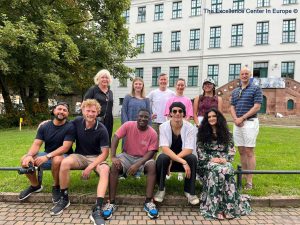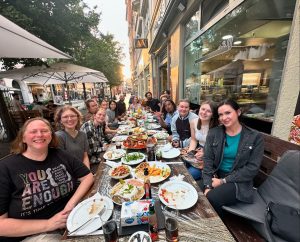Learning a new language introduces you to more than a different set of grammar or vocabulary, it opens your life to a new culture and way of life. For every language you learn, you open your mind to a different perspective beyond what you knew before.
Learning Arabic or German is an opportunity to be able to make new friends, read new books, appreciate new music, and understand multiple countries’ history, politics, traditions and more. Studying a new language also helps to improve the capabilities of your brain and memory. It can be described as exercise for the brain.
Opportunities at the Excellence Center
The Excellence Center in Halle is unique for its role as a place of immersion in German and Arabic. You have the opportunity on a daily basis to practice your German and/or Arabic conversationally with everyone here as well as taking courses in the chosen language.
Languages are a focal point to this international center. The center’s bookshelves contain a variety of books and textbooks for aiding your language learning. Even the center’s office wall is scattered with inspiring words in English, Arabic and German. Conversations flow from English to Arabic and to German. In this way, you can practice your language both independently and socially.
Being open and confident when learning a foreign language
While some people may feel intimidated about the challenge of learning a new language, especially when it uses a different alphabet from their mother tongue like with Arabic, the challenge can be rewarding, enriching and fun.
Tips for language learning Arabic or German
- You should not be afraid of making mistakes when learning the target language; this is part of the process of improvement. Feel open to try to communicate in the target language even if you are not sure about the grammar or pronunciation. For a conversation in the target language, perfection of fluency and accuracy is not necessary in order to communicate meaning.
- Do not neglect any of the 4 skills required to mastering a language- reading, writing, listening and speaking. For example, you can try reading a German road sign, writing a letter in German, listening to Arabic music and speaking with Arabic friends.
- For further development of your language, try to combine the practice of 2 of the 4 skills at once. For instance, read a German book aloud to practice reading and speaking skills together. Try to write down the words you hear from the radio to practice writing and listening skills together.
- Revise what you learn to instill it in your memory. Repetition is important for any type of learning but it is particularly relevant to language learning because of the large number of new words and grammar you shall come across at the beginning. Try spaced repetition for most effective memorization.
- Keep a notebook in which you can write down all the new phrases and words you come across in the target language. If you see pen and paper as a little archaic, try using an app of your choice to note vocabulary, such as Quizlet.
- Over time you shall come to know how you learn best as a linguist. Experiment with different methods to come to this understanding. It is paramount that you personalize your learning to your preferences; everyone learns differently. Perhaps you learn best by studying in the corner of a quiet room, by conversing with others, or by studying 10 words of the target language before going to sleep.
- Find what you enjoy so that language learning becomes desirable rather than tiresome. E.g. watch German films or listen to the news in Arabic so that you are stimulated while learning. The internet is full of engaging resources and websites that are entertaining and contemporary in your target language.
- Make the target language a part of daily life. This is important because it is much more effective to study a language for a small amount of time regularly than in bursts of intense studying sporadically.
- Consider going to a country or location where the target language is spoken. Full immersion where you can hear the language in daily conversation and ask questions to a native/local speaker is useful and makes language learning more practical.
- Persevere, don’t see the challenge in a negative light. There are moments for all linguists when language barriers can be frustrating and you feel unable to express yourself fully. Yet, the inability to express yourself exactly as you would in your mother tongue teaches you how to communicate more effectively and problem solve.
Final Remarks
Speaking more than one language opens up opportunities to connect with the world, whether that be through friendship, traveling or work. To have a multicultural world of solidarity and peace, we must understand each other with compassion, and one way of achieving this is through language learning.
In the words of Nelson Mandela, “If you speak to a man in a language he understands, you speak to his head. If you speak to him in his language, you speak to his heart.”



